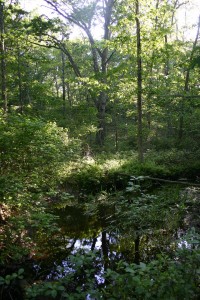Failure of the Conservation Easement
The following letter appeared in local newspapers and is shared with us here by the author Michael Chambers

The June 1 Charlestown Financial Referendum resulted in the passing of the questions requiring added expenditures. The only question that would have cost the taxpayer nothing was rejected. The conservation easement for the Charlestown Moraine Preserve failed to garner enough votes for passage. Essentially, the voters chose to spend a total of $15,696,492 and reject a free insurance policy. To say that I am disappointed would be an understatement but the voters have chosen to reserve this valuable piece of property until a future town council can think of a way to develop it. Maybe we should begin calling that property the Charlestown Moraine Reserve.
I feel like I have to take some responsibility for the rejection of the conservation easement. In the face of much deception by the opposition, I attempted to give the voters the truth about easements that protect property. In the face of outright disinformation, I chose to present the facts as openly and completely as possible. I should not have attempted to educate the voters to the facts, but instead should have identified any one of the many Internet links where they could see for themselves the legal descriptions of conservation easements. Also, those opponents, who said that the Charlestown Moraine Preserve did not need any protection because the town owned the land, were successful at misleading the voters. In addition, they claimed that the taxpayers would be prohibited from using the property, which was a bald-faced lie.
There are approximately 105,893 conservation easements in the United States that include 22,204,790 acres of land (www.landtrustalliance.org). This is an area about the size of the State of Indiana. This is not a new, untested land conservation measure. In Rhode Island, Charlestown’s Town Solicitor, Peter Ruggiero, co-authored The Rhode Island Conservation Easement Guidance Manual, which is a very good source of information on the subject. Supported by the Audubon Society of Rhode Island, DEM, NOAA, the RI Foundation, Narragansett Bay Research Reserve, and the National Estuarine Research Reserve System, this guide provides information important to RI land owners (www.nbwctp.org). Other sites to research are www.nature.org , www.conservationeasement.us , and law.justia.com – RI General Laws 33-9-30. Rhode Island recognizes the validity and import of conservation easements through the Real Estate Sales Disclosure restrictions at 5-20.8-2 (xxi), “Easements and Encroachments.”
I don’t know if this information would have made a difference in the voting outcome, but it would have made the deceptions offered by the opposition more apparent and, if I know voters, they don’t like to be deceived.
Mr. Chambers is a member of the Charlestown Zoning Board of Review